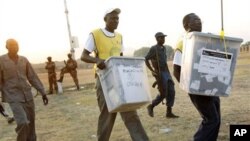Polls are now closed in Sudan and as the referendum on independence in Southern Sudan ends, a consensus is growing that the vote was a success. There are still some hurdles to overcome before the vote is certified.
After a first day or two of very long lines, voters who waited until Saturday, the last day of voting, to cast their ballots found the waits were long gone. Voters at the polls on Saturday came across more police and bored-looking poll-workers than other voters.
According to Loro Amos, the chairman of a center in central Juba, about 95 percent of those registered at his center have already voted.
"It was on the third day that the queue was not so long. At the end of the day today, we shall resume with the counting process and then we shall force the results tomorrow out," said Amos.
The referendum on southern independence is the centerpiece of a 2005 peace deal that ended 21 years of civil war between north and south. Many doubted whether the vote would take place, the preparations were supposed to be done over the course of three years. Instead, it was thrown together in about four months.
Mohamed Ibrahim Khalil is the commissioner of the referendum commission. "When we began we were daunted with the difficulty and complexity of the task," he said.
The voting process has been widely praised. Members of the northern ruling party appear ready to accept the results. The Carter Center, African Union and European Union have all praised the conduct of the referendum, despite a few isolated incidents.
According to Khalil, as of the close of voting Friday, 83 percent of registered voters had cast their votes in the south. The numbers were much lower in the north, with only 53 percent of registered voters going to the polls. But because only 116,000 people registered in the north, low turnouts there will not affect results, which required a sixty percent turnout to be valid.
Khalil said this was the best election he had witnessed in Sudan. "I have watched a number of elections in this country and this has been the most peaceful, the most orderly and the most quiet," he said.
But even as the vote now appears to have been valid and peaceful, the celebratory atmosphere that marked the the first day of voting has not returned to Juba. The United Nations says people in South Sudan will have to wait until at least February 2 for preliminary results to be announced and then another one to two weeks for final results.
According to the south’s minister of information, Bernaba Marial Benjamin, if the vote is for separation, the governments of north and south will go back to the negotiating table after results are announced. Still to be worked out, are a number of issues, such as how to share the country’s oil wealth, how to split $38 billion in debt, and most difficult of all, the future of the contested border region Abyei.




